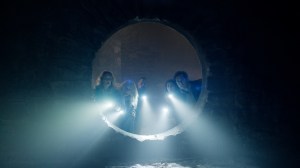Scarlett Johansson responds to “mixed reactions” to Black Widow’s death in Avengers: Endgame, saying Natasha Romanoff’s sacrifice just “made so much sense.” Five years after half of all life in the universe is snapped out of existence by Thanos (Josh Brolin) in Avengers: Infinity War, Black Widow and Hawkeye (Jeremy Renner) journey to the barren planet Vormir to retrieve the Soul Stone: one of six Infinity Stones needed to bring everyone back. When the ghostly Red Skull (Ross Marquand) reveals the stone seekers must make an everlasting exchange — a soul for a soul — it’s Natasha who makes the ultimate sacrifice.
Videos by ComicBook.com
“It’s funny because I’ve had kind of a lot of mixed reactions to her ultimate fate in Endgame,” Johansson told Entertainment Tonight during a 2019 visit to the set of Black Widow. “But for me, it made so much sense that she would sacrifice herself not just for the greater good of humanity, but actually for her friends, which was really at the heart of it. She’s a good one.”
Before she erases the red in her ledger in Endgame, Natasha’s past comes back to haunt her when she reunites with her found family from before the Avengers — Russian super-soldier Red Guardian (David Harbour) and the Red Room-trained super-spy assassins Yelena Belova (Florence Pugh) and Melina Vostokoff (Rachel Weisz) — in Black Widow, a “mid-quel” set in-between the events of 2016’s Captain America: Civil War and 2018’s Infinity War.
“I think what’s interesting to place [Black Widow] at this time [in the Marvel Cinematic Universe timeline], you already know the mythology of what she’s going to do in those movies,” Harbour told ET. “And so [you see] how she got to that place a couple of years before by reuniting with these people from her past.”
Endgame director Joe Russo previously agreed there was no “better endpoint” for Natasha than her self-sacrifice, saying on the film’s home commentary track: “Death is not always a bad thing. It can be a noble end. And it can be spiritual, and it can be heroic. If you sacrifice yourself for billions, it would seem to be a powerful ending to your story.”
Added co-screenwriter Christopher Markus, “And for a character who has been trying to ‘erase the red in her ledger,’ to use [The Avengers writer-director] Joss [Whedon’s] phrase, this is the final erasure.” Co-writer Stephen McFeely said of Natasha’s Endgame ending, “That’s what the arc for all these folks is, right? That she went from guilty to erasing all this… I can’t think of a better endpoint.”
In Marvel Studios’ action-packed spy thriller Black Widow, Natasha Romanoff aka Black Widow confronts the darker parts of her ledger when a dangerous conspiracy with ties to her past arises. Pursued by a force that will stop at nothing to bring her down, Natasha must deal with her history as a spy and the broken relationships left in her wake long before she became an Avenger. Johansson reprises her role as Natasha/Black Widow, Florence Pugh stars as Yelena, David Harbour portrays Alexei/The Red Guardian, and Rachel Weisz is Melina. The film is directed by Cate Shortland and produced by Kevin Feige.
Marvel’s Black Widow releases in theaters and on Disney+ Premier Access on July 9.








